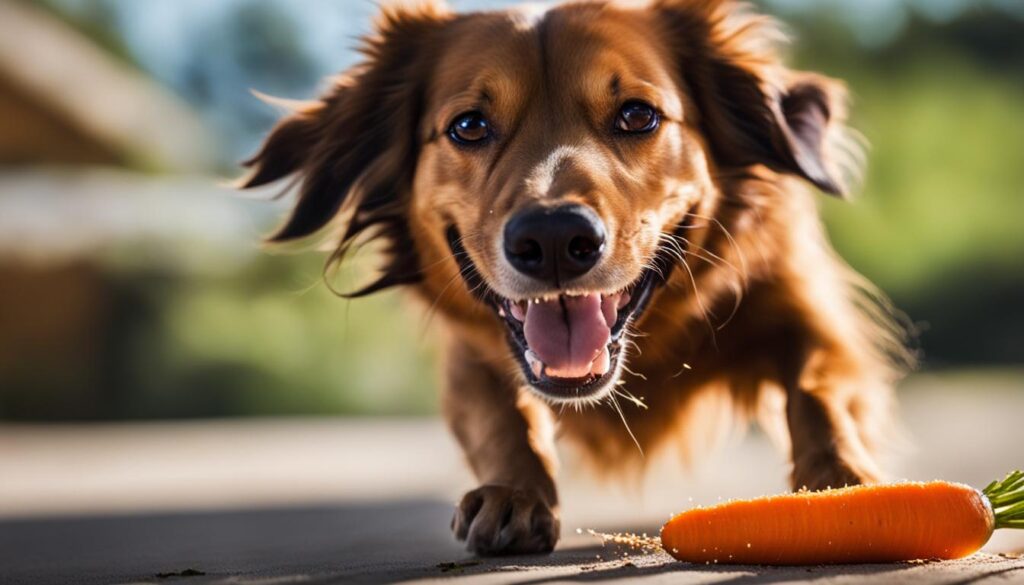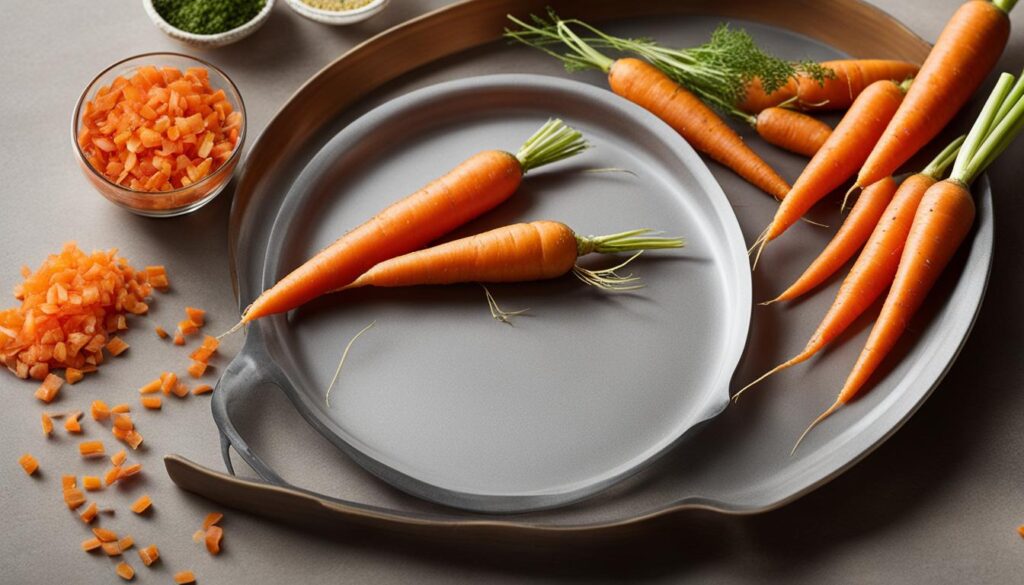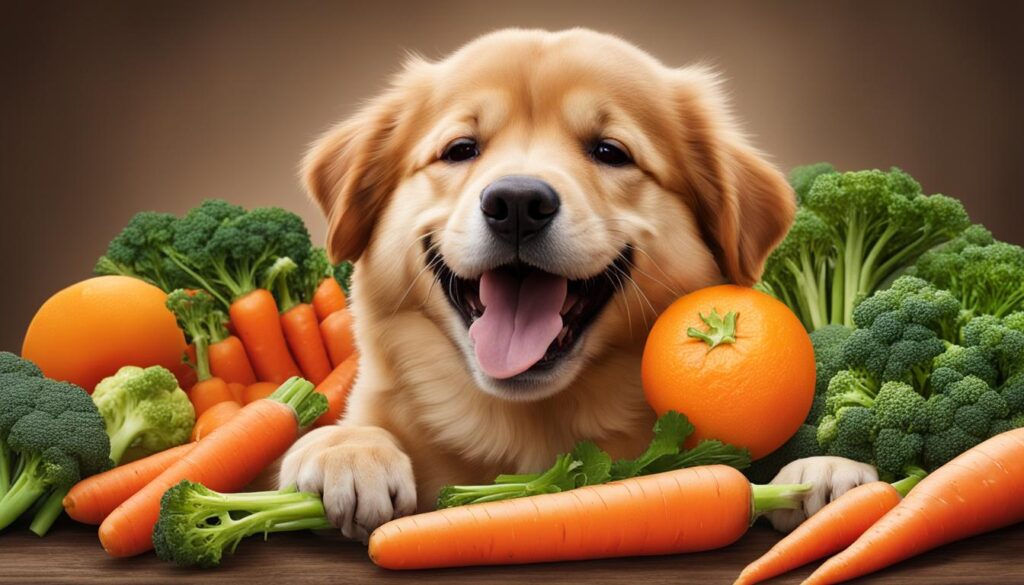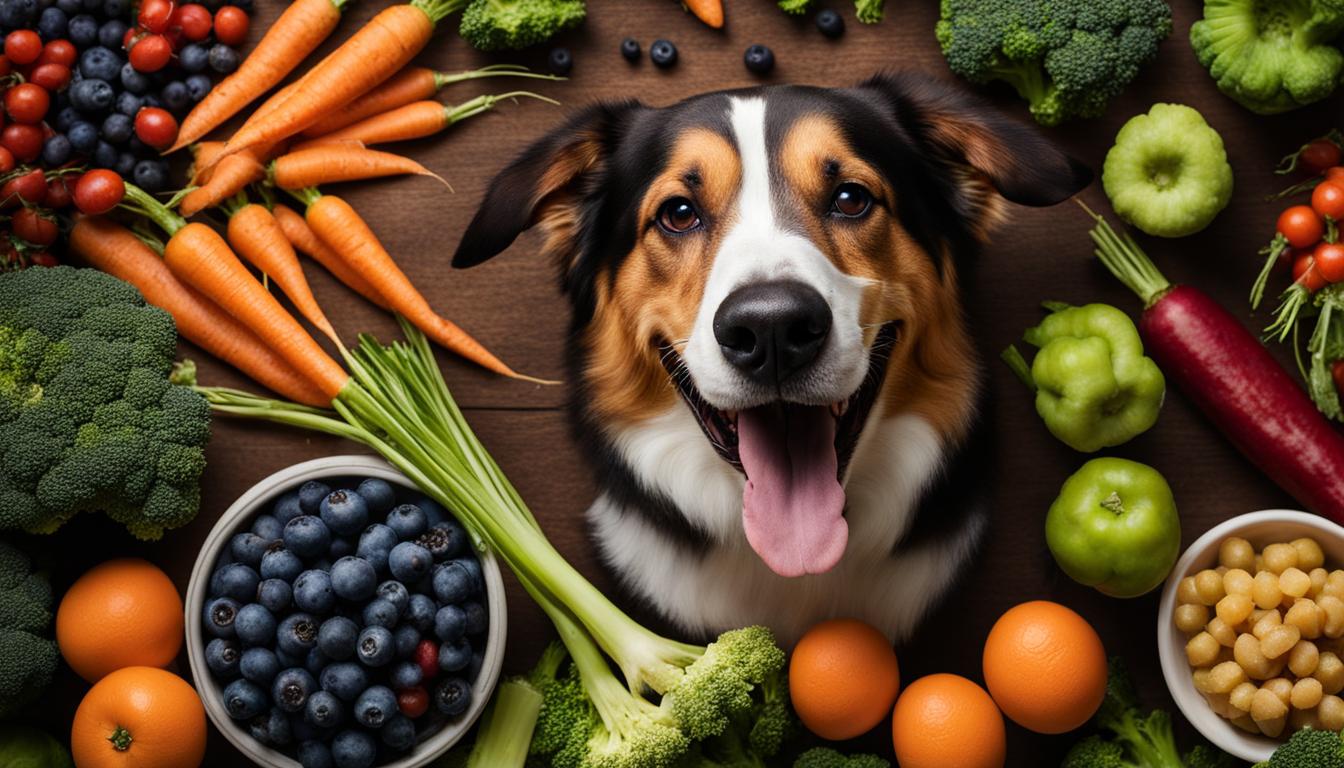Are you wondering if your furry friend can munch on some carrots? Well, the answer is a resounding yes! Carrots are not only safe for dogs but also offer a range of nutritional benefits. So, let’s dig into why carrots make a paw-some addition to your canine companion’s diet.
Key Takeaways:
- Carrots are a safe and nutritious treat for dogs.
- They support dental health and can help remove plaque.
- Carrots are low in calories and fat, making them a healthy snack for weight-conscious dogs.
- They contain fiber, promoting bowel movement regularity.
- Carrots are rich in beta-carotene and Vitamin A, essential for overall health.
The Dental Health Benefits of Carrots for Dogs
When it comes to maintaining your dog’s dental health, carrots can be a valuable addition to their diet. Chewing on carrots provides a mechanical scraping action that helps remove plaque and prevent the buildup of tartar on their teeth. The fibrous texture of carrots acts as a natural toothbrush, promoting oral hygiene and reducing the risk of dental diseases.
Frozen carrots are particularly beneficial for your dog’s dental health. The cold temperature helps to soothe any inflammation in the gums and provides a gentle massage, which stimulates blood flow and promotes healthy gum tissue. Additionally, the firmness of frozen carrots provides an effective cleaning action as your dog chews, helping to remove any debris or food particles stuck between their teeth.

Incorporating carrots into your dog’s diet not only supports their dental health but also provides a tasty and nutritious treat. Whether you offer them raw or lightly cooked, carrots are packed with vitamins, minerals, and antioxidants that contribute to your dog’s overall well-being. Just remember to introduce carrots gradually, especially if your dog is not accustomed to them, and always monitor for any adverse reactions.
The Dental Health Benefits of Carrots
“Chewing on carrots provides a mechanical scraping action that helps remove plaque and prevent the buildup of tartar on their teeth.”
| Benefits of Carrots for Dogs | How It Helps |
|---|---|
| Plaque and tartar prevention | The crunchiness of carrots helps scrub the teeth, removing plaque and preventing tartar buildup. |
| Stimulation of gum tissue | The fibrous texture of carrots massages the gums, promoting blood flow and healthy gum tissue. |
| Removal of debris | Chewing on carrots helps dislodge food particles stuck between teeth, reducing the risk of infection. |
| Natural toothbrush | The firmness of carrots acts as a natural toothbrush, promoting oral hygiene and fresh breath. |
By including carrots in your dog’s diet, you can contribute to their dental health while providing them with a tasty and nutritious treat. Just ensure that the carrots are served in an appropriate size for your dog’s breed and age, and always consult with your veterinarian if you have any concerns about your dog’s dental health or diet.
Carrots as a Low-Calorie and Low-Fat Treat

When it comes to treating your dog, finding options that are both delicious and healthy can be a challenge. Luckily, carrots offer a fantastic solution as a low-calorie and low-fat treat for your furry friend. Carrots are not only packed with essential nutrients, but they also provide a satisfying crunch that dogs love.
With only about four calories per baby carrot, carrots are an excellent choice for dogs watching their weight or dealing with specific health concerns. Whether your dog has diabetes, needs to shed a few pounds, or simply enjoys a guilt-free snack, carrots fit the bill perfectly. You can feel good about giving your dog a treat that won’t compromise their diet or lead to unwanted weight gain.
What makes carrots even more appealing as a treat option is their low-fat content. Dogs, just like humans, require a balance of nutrients for optimal health. By incorporating carrots into your dog’s diet, you can provide them with an enjoyable snack while keeping their fat intake in check.
The Benefits of Carrots as a Low-Calorie and Low-Fat Treat:
- Helps with weight management
- Safe for dogs with diabetes
- A guilt-free snack for dogs
- Keeps fat intake low
So, the next time your pup deserves a tasty reward, grab some carrots and watch their tail wag with delight.
Promoting Bowel Movement Regularity with Carrots
Carrots can play a beneficial role in promoting bowel movement regularity in dogs. This is due to their high soluble fiber content, which aids in digestion and helps maintain healthy bowel movements. Just nine baby carrots contain 2 grams of fiber, making them a valuable addition to a dog’s diet for maintaining regularity.
Introducing carrots gradually to your dog’s diet is important to avoid any potential digestive upset. Start by offering small amounts and monitor your dog’s reaction. Some dogs may experience looser stools initially, but this should normalize as their digestive system adjusts to the increased fiber intake. Remember to provide fresh drinking water alongside carrots to help the fiber pass through the digestive system comfortably.
To showcase the beneficial effects of carrots on bowel movement regularity, here is a table summarizing the fiber content and benefits:
| Carrots | Fiber Content (per 9 baby carrots) | Benefits |
|---|---|---|
| 9 baby carrots | 2 grams | Promotes bowel movement regularity |
As with any dietary change, it’s essential to consult with your veterinarian before introducing carrots or any other new food to your dog’s diet, especially if your dog has any pre-existing health conditions or dietary restrictions.
The Nutritional Value of Carrots for Dogs
When it comes to the nutritional needs of your furry friend, carrots can provide a host of benefits. These vibrant orange vegetables are packed with essential nutrients that contribute to overall dog health. From promoting eye health to supporting a strong immune system, carrots have much to offer in terms of dog nutrition.

One of the key nutritional components of carrots is beta-carotene, which serves as an antioxidant and is a precursor to Vitamin A. Beta-carotene plays a crucial role in maintaining healthy eyesight in dogs, especially as they age. Additionally, carrots contain Vitamin C, lutein, lycopene, and anthocyanins, all of which contribute to the overall well-being of your dog.
Benefits of Carrots for Dogs:
- Eye Health: The beta-carotene in carrots supports optimal eye function and helps prevent vision-related issues.
- Immune System Support: The antioxidants found in carrots help strengthen your dog’s immune system, enhancing their ability to fight off infections and diseases.
- Healthy Skin and Coat: The nutrients present in carrots contribute to a shiny coat and healthy skin, reducing the risk of dryness and itching.
- Overall Growth and Health: Carrots provide essential vitamins and minerals that are crucial for the growth and maintenance of your dog’s overall health.
It’s worth noting that while carrots offer nutritional benefits, they should not replace a balanced and complete diet. Commercially produced dog foods are formulated to meet the nutritional requirements of dogs, but incorporating carrots into your dog’s diet can provide additional nutrients and variety.
| Nutrient | Amount per 100g |
|---|---|
| Carbohydrates | 9.58g |
| Protein | 0.93g |
| Fiber | 2.8g |
| Fat | 0.24g |
| Vitamin A | 835μg |
| Vitamin C | 5.9mg |
Adding a handful of carrots to your dog’s diet can provide a nutritional boost and a tasty treat. Just remember to introduce carrots gradually, monitor your dog’s reaction, and consult with your veterinarian if you have any concerns. With their crunchy texture and nutritional value, carrots are a delightful and wholesome addition to your dog’s diet.
Ways to Safely Feed Carrots to Dogs
Carrots offer a versatile and nutritious treat option for your furry friend. Let’s explore some creative ways to incorporate carrots into your dog’s diet:
Carrot Dog Treat Recipes
One popular option is to make homemade carrot dog treats. Here’s a simple recipe to try:
“Carrot Crunchers”
- Ingredients:
- 2 cups grated carrots
- 1 cup whole wheat flour
- 1/2 cup rolled oats
- 1/4 cup peanut butter (no xylitol)
- 1/4 cup water
- Instructions:
- Preheat the oven to 350°F (175°C).
- In a mixing bowl, combine the grated carrots, whole wheat flour, and rolled oats.
- Add the peanut butter and water to the dry ingredients and mix until well combined.
- Roll the dough into small balls and place them on a baking sheet lined with parchment paper.
- Flatten each ball with a fork to create a cookie shape.
- Bake for 20-25 minutes or until golden brown.
- Allow the treats to cool completely before serving them to your dog.
Carrot Sticks for Dogs
Another option is to simply cut carrots into bite-sized sticks. This makes for a convenient and healthy snack that your dog can enjoy on the go.
Carrot-Based Dog Treats
If you’re looking for store-bought options, there are plenty of carrot-based dog treats available. Look for treats made with real carrots and minimal additives or preservatives. Always check the ingredient list to ensure the treats are safe for your dog.
Summary
Whether you’re whipping up homemade carrot dog treats or offering carrots as a simple snack, these tasty vegetables can be a delightful addition to your dog’s diet. Just remember to introduce carrots gradually, especially if it’s their first time trying this crunchy treat. Always consider your dog’s size, age, and any specific dietary restrictions when offering carrots or any other new food. With these various ways to safely feed carrots to dogs, you can provide them with a healthy and enjoyable treat that’s packed with beneficial nutrients.
Considerations and Cautions when Feeding Carrots to Dogs
While carrots are generally safe for dogs, there are a few considerations to keep in mind. Some dogs may have allergies or sensitivities to carrots, so it’s important to monitor their reaction when introducing this new treat. Puppies can enjoy carrots as well, but the introduction should be gradual. Since dogs cannot fully digest raw carrots, cooking or lightly steaming them is recommended. It’s important to feed carrots in moderation and not exceed 10% of a dog’s daily calorie intake.
Just like humans, dogs can have allergies to certain foods, including carrots. If your dog shows any signs of an allergic reaction, such as itching, redness, or gastrointestinal upset, it’s best to discontinue feeding carrots and consult a veterinarian. Remember to always introduce new foods slowly and in small amounts.
When it comes to puppies, their digestive systems are still developing, so it’s important to introduce new foods cautiously. Start by offering small, cooked carrot pieces as a treat and observe how your puppy reacts. If there are no adverse effects, gradually increase the amount of carrots in their diet. As with adult dogs, it’s crucial to monitor their digestion and adjust accordingly.
While carrots offer numerous health benefits, feeding them in moderation is key. Too many carrots can lead to stomach upset, diarrhea, or even weight gain in some dogs. Aim to incorporate carrots as part of a varied and balanced diet, ensuring they make up no more than 10% of your dog’s daily caloric intake.
Conclusion
So, can dogs eat carrots? Absolutely! Carrots are not only safe but also offer a range of nutritional benefits for your furry friend. From promoting dental health to supporting regular bowel movements, these vibrant orange veggies have got your pup covered.
Not only are carrots low in calories and fat, making them a guilt-free treat option, but they also pack a punch in terms of essential nutrients. With the presence of beta-carotene, Vitamin A, and antioxidants, carrots contribute to a thriving immune system, healthy skin, and coat, as well as overall growth and maintenance.
Whether you choose to feed your dog raw or lightly cooked carrots, you can rest assured that you’re providing a crunchy and wholesome addition to their diet. Just remember to introduce carrots gradually, especially for puppies, and monitor your dog for any signs of allergies or sensitivities.
So, next time you’re looking for a tasty and nutritious treat for your four-legged companion, reach for the carrots. Your dog will thank you with wagging tails and a happy, healthy smile!
FAQ
Can dogs eat carrots?
Yes, dogs can safely eat carrots and enjoy their many nutritional benefits.
What are the dental health benefits of carrots for dogs?
Chewing on carrots helps remove plaque and prevent buildup, promoting dental health. Frozen carrots can also gently scrape the teeth and massage the gums for daily cleaning.
Are carrots a low-calorie and low-fat treat for dogs?
Yes, carrots are low in calories and fat, making them a healthy option for dogs watching their weight or with diabetes.
How can carrots promote bowel movement regularity in dogs?
Carrots are high in soluble fiber, which helps improve bowel movement regularity. Just 9 baby carrots contain 2 grams of fiber.
What is the nutritional value of carrots for dogs?
Carrots are rich in beta-carotene, Vitamin A, Vitamin C, and other antioxidants. These nutrients support eye health, a strong immune system, healthy skin and coat, and overall growth and health maintenance in dogs.
How can I safely feed carrots to my dog?
Carrots can be mixed into balanced meals, grated on top of regular food, mashed, steamed, or frozen as teething aids. Remember to cut carrots into bite-sized pieces to avoid choking hazards.
Are there any considerations or cautions when feeding carrots to dogs?
Some dogs may have allergies or sensitivities to carrots, so monitor their reaction. Puppies can enjoy carrots, but introduce them gradually. Cooking or lightly steaming carrots is recommended for optimal nutrient absorption. Feed carrots in moderation and not exceed 10% of a dog’s daily calorie intake.





